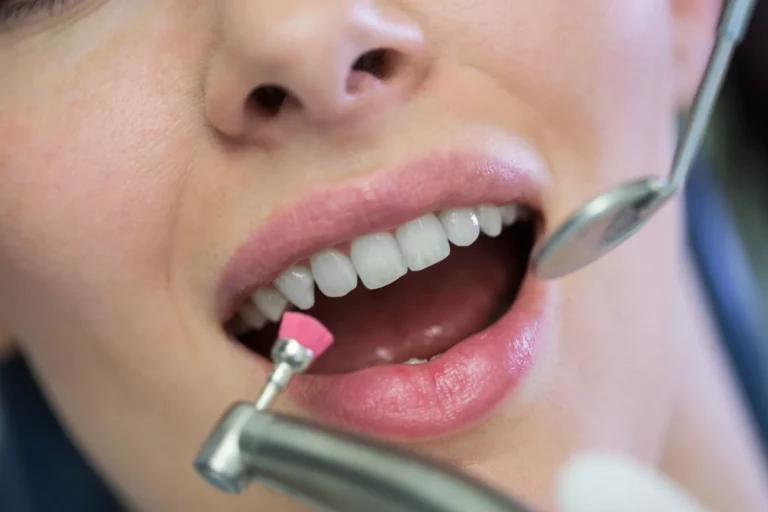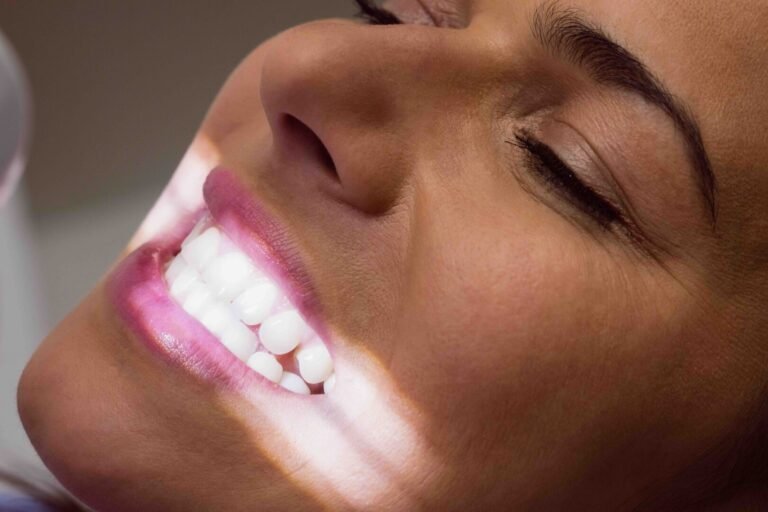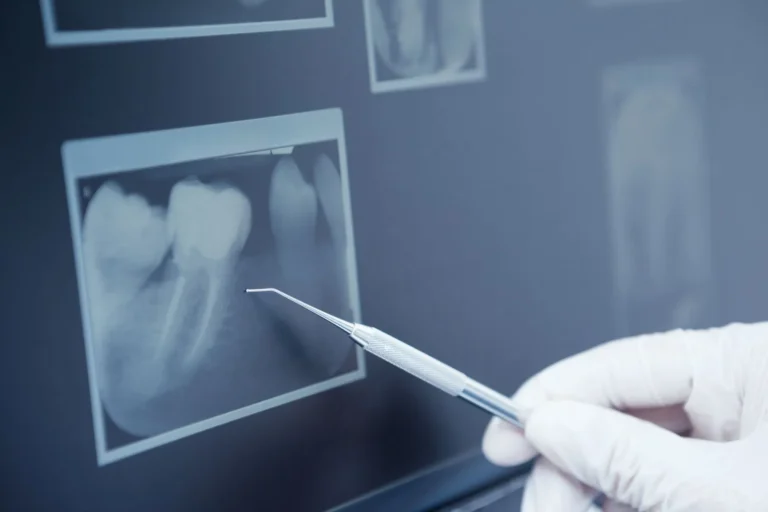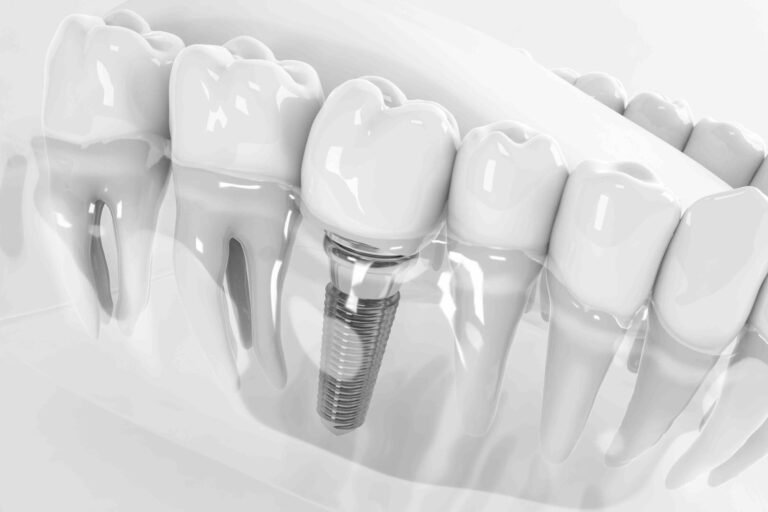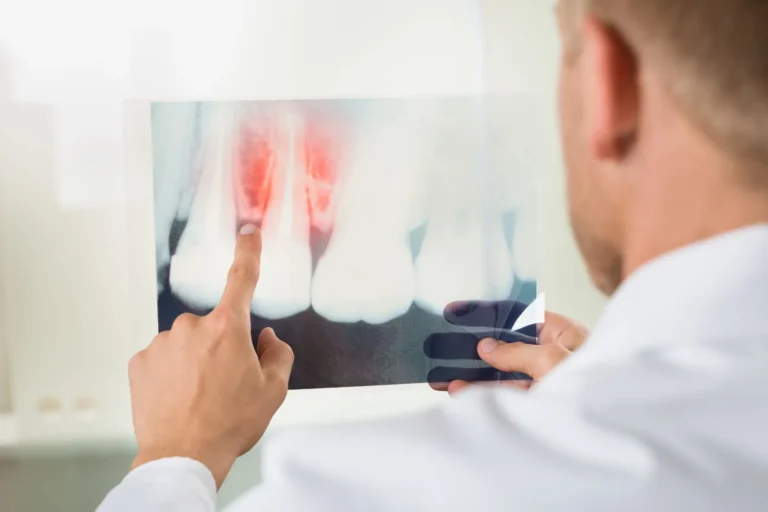What is a root canal and why is it needed?
When patients first hear about what is a root canal, they often associate it with pain and fear. However, in reality, a root canal is a procedure designed to eliminate pain, save the natural tooth, and prevent more serious complications.
A root canal treatment becomes necessary when the innermost part of the tooth — called the pulp — becomes infected or inflamed.
The pulp contains vital components like nerves, blood vessels, and connective tissue, all enclosed within the hard layers of enamel and dentin.
Several factors can lead to pulp damage, including:
- Deep tooth decay:
If a cavity reaches the pulp, bacteria can invade, causing infection and inflammation. - Repeated dental procedures:
Multiple treatments on the same tooth, such as fillings or crowns, can irritate the pulp over time. - Trauma or injury:
A blow to the mouth, even if no visible crack appears, can cause internal pulp damage. - Large fillings:
Extensive restorations can compromise the health of the pulp.
When the pulp becomes infected or dies, the tooth can no longer defend itself against bacterial invasion. This can lead to:
- Severe pain and sensitivity
- Abscess formation at the tip of the root
- Swelling that can spread to the face, neck, or head
- Bone loss around the root
- Systemic infections if bacteria enter the bloodstream
Without prompt intervention, the infection can spread beyond the tooth, endangering overall health and resulting in tooth loss.
The purpose of a root canal procedure is to:
- Remove the infected or inflamed pulp:
This step eliminates the source of infection and pain. - Clean and disinfect the inside of the tooth:
Specialized instruments and antibacterial solutions ensure that no bacteria remain inside the root canals. - Fill and seal the space:
Once cleaned, the canals are filled with a biocompatible material (usually gutta-percha) and sealed to prevent re-infection. - Restore the tooth with a crown or filling:
A final restoration, often a custom-made dental crown, strengthens the tooth and restores its full function and aesthetics.
Understanding what is a root canal helps patients appreciate that it’s not the source of pain — it’s actually the solution to eliminate infection and preserve their natural tooth structure whenever possible.
Modern root canal therapy is highly successful and far more comfortable than many imagine.
Thanks to advancements in technology, anesthesia, and techniques, most root canal procedures today are no more uncomfortable than getting a standard dental filling.
Choosing root canal therapy means choosing:
- To preserve your natural smile
- To maintain normal biting and chewing forces
- To protect surrounding teeth from excessive wear or strain
- To avoid the need for more complex tooth replacement options like implants or bridges
➔ Learn how root canal therapy at Premier Smile Dental Excellence can save your natural teeth and restore your health with expert care.
How does a root canal procedure work step-by-step?
Understanding how a root canal procedure works can transform fear into reassurance.
Many patients who ask what is a root canal imagine a long, painful process, but in reality, modern root canal therapy is a predictable, comfortable, and highly refined treatment designed to save teeth efficiently and safely.
Here’s a detailed step-by-step breakdown of how a root canal treatment is typically performed:
- Initial Diagnosis and Imaging:
The first step is a comprehensive dental examination.
We use advanced diagnostic tools such as digital X-rays and sometimes 3D imaging to determine the extent of the infection or inflammation. This imaging helps us visualize the root canals’ shape and detect any hidden infections in the surrounding bone. - Local Anesthesia:
To ensure your complete comfort, the affected area is thoroughly numbed using modern local anesthetics.
At Premier Smile Dental Excellence, we take extra care to make sure you are completely at ease before starting the procedure.
Many patients find that a root canal is no more uncomfortable than a simple filling. - Isolation of the Tooth:
A rubber dam — a small protective sheet — is placed around the tooth to keep it clean and dry during the procedure.
This prevents contamination from saliva and improves both comfort and success rates. - Creating an Access Opening:
A small opening is made in the crown of the tooth to access the pulp chamber and root canals.
Through this entry point, we gain the necessary access to clean and disinfect the internal structures of the tooth. - Cleaning and Shaping the Root Canals:
Using fine, flexible instruments and powerful disinfecting solutions, we carefully remove the infected pulp, eliminate bacteria, and shape the canals for proper sealing.
Special rotary tools allow us to clean even the most complex root systems with precision. - Disinfection:
Once the canals are cleaned and shaped, they are thoroughly irrigated with antibacterial solutions to eliminate any remaining microorganisms and reduce the risk of re-infection. - Filling the Canals:
The cleaned spaces are then filled with a biocompatible material, usually gutta-percha, and sealed with an adhesive cement to prevent bacteria from re-entering.
This filling restores the internal structure of the tooth and ensures stability. - Temporary or Permanent Restoration:
Depending on your individual case, a temporary filling may be placed until a permanent crown can be made.
In most cases, especially for posterior teeth (molars), a permanent crown is strongly recommended to protect the tooth against fractures. - Final Restoration and Protection:
At a subsequent appointment, a custom-designed crown is bonded onto the treated tooth to restore full function, aesthetics, and protection.
The crown ensures the treated tooth can withstand the forces of chewing for many years to come.
How long does the whole procedure take?
- Simple cases may be completed in a single appointment of around 60 to 90 minutes.
- More complex infections or multi-rooted teeth may require two or more visits to ensure complete cleaning and healing.
Important:
Root canal treatment is designed to eliminate infection at its source, meaning that once the therapy is complete, your tooth can function pain-free and naturally for decades if properly cared for.
➔ Experience the comfort and precision of modern root canal therapy at Premier Smile Dental Excellence — protecting your smile has never been easier.
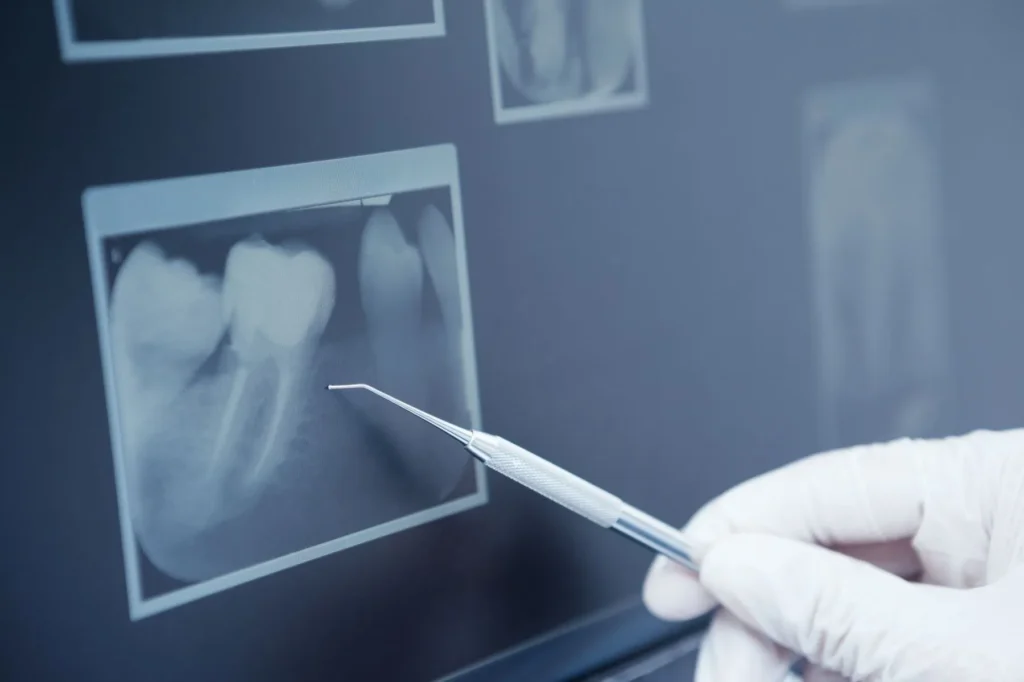
Can a root canal save my tooth permanently?
One of the most common concerns among patients learning what is a root canal is whether the procedure offers a permanent solution for their dental problems.
The encouraging answer is: yes, a properly performed root canal can save your natural tooth for a lifetime — provided that the treatment is executed to a high standard and that you maintain excellent oral hygiene afterward.
How does a root canal save the tooth permanently?
- Elimination of infection:
By removing the inflamed or infected pulp, a root canal completely removes the source of infection, stopping it from spreading further inside the tooth or to surrounding bone structures. - Sealing and protection:
After cleaning, the root canals are sealed hermetically with a biocompatible material. This prevents any re-entry of bacteria, keeping the inside of the tooth sterile. - Restoration with a strong crown:
To finalize the treatment, the tooth is usually restored with a custom-designed crown. This restoration reinforces the tooth’s structure, allowing it to withstand daily chewing forces without the risk of fracture.
Studies show that teeth treated with a high-quality root canal and properly restored with a crown have success rates above 90–95% even after 10–15 years.
Many patients retain their treated teeth for decades without any issues.
Factors that influence the long-term success of a root canal include:
- Skill and precision of the dentist:
At Premier Smile Dental Excellence, root canals are performed by experienced clinicians using advanced technologies to maximize precision. - Timely restoration with a crown:
Placing a crown shortly after root canal therapy greatly enhances the tooth’s durability and protects it from cracks. - Patient’s oral hygiene habits:
Daily brushing, flossing, and routine dental check-ups are essential to maintaining the health of the root canal-treated tooth and surrounding structures. - Overall health conditions:
Conditions like diabetes or autoimmune disorders can affect healing, but with proper management, excellent outcomes are still achievable.
Important to remember:
Without a root canal, an infected or damaged tooth would inevitably be lost. Tooth extraction leads to a cascade of further issues, such as bone loss, shifting of neighboring teeth, and the need for more invasive and expensive replacements like implants or bridges.
Choosing to undergo a root canal means:
- Preserving your natural tooth structure
- Maintaining full chewing function
- Avoiding unnecessary extractions and complex prosthetic work
What is a root canal if not a second chance for your tooth?
Thanks to this treatment, your smile can remain natural, healthy, and beautiful for years to come.
➔ Find out how Premier Smile Dental Excellence ensures the long-term success of your root canal treatments — and helps you protect your natural teeth for life.
Why does a tooth need a crown after a root canal?
After learning what is a root canal, many patients ask why it’s often necessary to place a crown on the treated tooth afterward.
The answer lies in the anatomy and biology of the tooth itself and in the structural changes that occur once the pulp has been removed.
Here’s why a crown is typically essential after root canal therapy:
- Loss of internal moisture:
The dental pulp naturally keeps the tooth hydrated and flexible. After a root canal, the tooth becomes more brittle and prone to fractures because it no longer receives this natural nourishment. - Weakened tooth structure:
Teeth that require root canals often have extensive decay, previous large restorations, or cracks that have already compromised their structural integrity.
Even though the infection is removed, the external walls of the tooth may be thin and fragile. - Biting forces:
Molar and premolar teeth, in particular, are subjected to heavy chewing forces every day. Without reinforcement, a root canal-treated tooth could fracture under pressure, leading to the potential loss of the tooth despite successful treatment. - Sealing protection:
A crown acts as a protective cap over the treated tooth, ensuring that bacteria from the oral environment cannot seep back into the root canal system and cause re-infection. - Aesthetic restoration:
In some cases, a tooth that has undergone a root canal may darken over time. A well-made crown restores the natural color, contour, and shine of your tooth, keeping your smile harmonious and beautiful.
When is a crown absolutely necessary after a root canal?
- For posterior teeth (molars and premolars) that handle high chewing forces.
- When significant tooth structure has been lost due to decay or trauma.
- If there’s a crack or fracture present in the tooth.
- When long-term sealing and reinforcement are needed to ensure treatment success.
Are there cases where a crown might not be immediately needed?
Yes. For front teeth (incisors and canines) that have minimal damage and are not exposed to heavy biting pressure, a strong bonded filling might suffice initially.
However, careful monitoring is always recommended, and a crown may still be advised later for optimal protection.
How Premier Smile Dental Excellence ensures optimal results:
- We use digital impressions and state-of-the-art laboratories to craft crowns that perfectly match the color, shape, and size of your natural teeth.
- Every crown is customized for maximum comfort, aesthetics, and function.
- We explain all your options clearly so you can make an informed decision about protecting your treated tooth.
Understanding what is a root canal includes recognizing that the treatment is not complete until the tooth is properly restored and protected.
A crown completes the healing journey, ensuring your tooth remains strong, functional, and beautiful for years to come.
➔ Learn how Premier Smile Dental Excellence designs and delivers beautiful, protective crowns following root canal treatment — preserving both your health and your smile.
What are the signs that I might need a root canal?
Recognizing early the signs that indicate you may need a root canal can make a profound difference in saving your natural tooth.
Many patients who ask what is a root canal are often surprised to learn that the symptoms of a damaged pulp can vary widely — from intense, sharp pain to subtle, almost unnoticeable changes.
Here are the most common signs that might suggest you need a root canal:
- Severe, persistent tooth pain:
One of the hallmark symptoms. If you experience a throbbing or sharp pain that doesn’t go away, especially when biting or applying pressure, it could indicate infection or inflammation inside the pulp. - Prolonged sensitivity to heat or cold:
Sensitivity that lingers for several seconds or even minutes after exposure to hot coffee or cold drinks could be a warning sign of nerve damage. - Tooth discoloration:
A tooth that darkens or turns gray could suggest internal damage or death of the pulp tissue. - Swelling and tenderness in the gums:
Swelling near the affected tooth, with or without pain, may indicate the presence of an abscess (a pocket of pus caused by infection). - A pimple-like bump on the gums:
Sometimes an abscess can drain through a small blister on the gums, leading to a bad taste in the mouth or unpleasant odors. - Loose tooth:
An infected tooth may feel loose because of bone loss caused by the infection around the root.
Other warning signs can include:
- Pain that radiates to the jaw, ear, or head
- Difficulty chewing
- Swelling in the face or neck
Important:
Not all teeth that require a root canal will present with obvious pain. Some teeth may have a “silent” infection detected only during a routine dental exam with X-rays.
That’s why regular check-ups at Premier Smile Dental Excellence are essential for early detection and intervention.
Ignoring the signs can lead to serious consequences, including:
- Spread of infection to other areas of the mouth, face, or even bloodstream (systemic infection)
- Complete destruction of the bone supporting the tooth
- Tooth loss, requiring more invasive and costly replacement solutions
Early intervention offers the best chance for successful treatment — with less pain, simpler procedures, and better long-term outcomes.
When should you contact your dentist?
- If you notice any of the symptoms listed above
- If you have had a dental injury, even without immediate pain
- If you experience a lingering toothache that seems to come and go
If you’re unsure whether your symptoms point toward what is a root canal situation, it’s always best to seek professional evaluation immediately.
Early diagnosis can mean the difference between saving your tooth easily or needing more complex interventions later.
➔ If you experience any of these symptoms, contact Premier Smile Dental Excellence today for an expert evaluation — protecting your smile starts with early action.
How painful is a root canal procedure?
One of the greatest myths surrounding what is a root canal is the idea that the procedure is extremely painful.
This misconception, often fueled by outdated stories, causes unnecessary anxiety for many patients.
In reality, modern root canal therapy is highly comfortable, and it is specifically intended to relieve pain, not cause it.
Here’s what you really need to know about pain and root canal treatment:
- Modern anesthesia makes the procedure virtually pain-free:
Before starting the treatment, the area around the affected tooth is thoroughly numbed with local anesthesia.
At Premier Smile Dental Excellence, we use advanced anesthetic techniques to ensure that you feel completely at ease. Most patients report feeling only slight pressure during the procedure — not pain. - Root canals eliminate existing pain:
Often, the pain associated with a tooth requiring a root canal stems from the infection or inflammation of the pulp.
The root canal procedure removes the infected tissue, disinfects the interior of the tooth, and resolves the underlying cause of the pain.
Many patients experience immediate relief after treatment. - Post-treatment discomfort is manageable and temporary:
After the anesthesia wears off, it’s normal to experience some tenderness in the area for a few days, especially if there was significant infection or swelling beforehand.
This mild discomfort is usually well-managed with over-the-counter pain relievers and resolves within a few days.
In rare cases, your dentist may prescribe stronger medication or antibiotics if necessary. - Minimally invasive techniques further reduce discomfort:
Thanks to technological advances such as rotary instruments, digital imaging, and high-magnification microscopes, today’s root canal procedures are faster, more precise, and less invasive than ever before.
These improvements significantly reduce both the time needed for the procedure and the healing period afterward.
Patient testimonials often surprise others:
Many patients who initially fear what is a root canal are amazed afterward at how comfortable and smooth the process actually is.
They frequently comment that the experience was easier than getting a filling or a crown, and that the procedure greatly relieved the severe pain they had been enduring.
What can you do to make your experience even more comfortable?
- Communicate openly with your dentist: If you’re nervous, tell us. We can adjust techniques, offer short breaks, or provide calming options.
- Follow all post-operative care instructions: This promotes fast, smooth healing.
- Attend all follow-up appointments: Ensuring your final restoration is placed promptly protects the treated tooth and completes the healing journey.
In summary:
If you are worried about how painful is a root canal, rest assured that the reality is far more reassuring than the myth.
Modern dentistry, especially at a leading practice like Premier Smile Dental Excellence, has transformed root canal therapy into a comfortable, efficient, and highly successful treatment that relieves pain — not causes it.
➔ Experience gentle, expert root canal care at Premier Smile Dental Excellence — restoring comfort, health, and confidence to your smile.
Why trust Premier Smile Dental Excellence for your root canal treatment?
When considering what is a root canal, it’s just as important to understand who should perform your treatment.
Choosing the right dental team makes a tremendous difference — not only for your comfort during the procedure but also for the long-term success of the therapy.
At Premier Smile Dental Excellence, we are proud to offer a comprehensive, expert-driven approach to root canal therapy, ensuring that every patient receives the highest standard of care.
Here’s why so many patients trust us for their root canal treatments:
- Specialist-Level Expertise:
Our practice is led by highly trained clinicians with advanced postgraduate qualifications in endodontics and restorative dentistry.
This specialization ensures accurate diagnosis, precision treatment, and optimal outcomes, especially in complex or challenging cases. - State-of-the-Art Technology:
We utilize the latest advancements, including:- Digital X-rays for precise diagnostics with minimal radiation exposure
- 3D Cone Beam CT scans for detailed visualization of complex anatomy
- Rotary instrumentation for faster, more efficient canal cleaning
- Operating microscopes for maximum precision during delicate procedures
- Patient-Centered Philosophy:
We understand that the thought of a root canal can be intimidating.
That’s why we place your comfort and peace of mind at the center of everything we do, offering:- Clear explanations at every step of your treatment
- Gentle techniques to minimize discomfort
- Flexible appointment scheduling to fit your needs
- Options for conscious sedation for highly anxious patients
- Meticulous Attention to Detail:
We don’t believe in rushing procedures.
Each root canal treatment at Premier Smile Dental Excellence is performed carefully and meticulously, ensuring that every canal is thoroughly cleaned, shaped, and sealed to prevent future issues. - Comprehensive Care Beyond the Procedure:
We don’t stop at simply treating the infection.
After your root canal, we ensure that the tooth is properly restored with high-quality materials — typically a custom-designed crown — to return full strength, function, and aesthetics. - Long-Term Maintenance Support:
We guide you through maintaining your treated tooth with:- Tailored oral hygiene advice
- Regular monitoring during check-ups
- Early intervention strategies if any issues arise
Choosing Premier Smile Dental Excellence for your root canal means choosing:
- Expertise you can trust
- Technology that enhances your experience
- A compassionate team that truly cares about your wellbeing
- A commitment to preserving your natural smile for life
Understanding what is a root canal is only the first step.
Choosing a skilled, experienced, and caring team is what truly makes the difference between a good outcome and an exceptional one.
➔ Trust Premier Smile Dental Excellence to provide gentle, expert root canal therapy that protects your smile and your health — today and for years to come.
Conclusion on what is a root canal
After exploring every aspect of what is a root canal, it’s clear that this treatment is not something to fear, but rather a powerful, safe, and effective way to save your natural teeth.
Root canal therapy plays a crucial role in modern dentistry, allowing millions of people each year to avoid tooth extractions and maintain a healthy, natural smile.
A root canal offers many key benefits:
- It removes infection and stops pain at the source
- It preserves your natural tooth structure
- It prevents the need for more invasive and costly procedures like implants or bridges
- It restores full chewing function and smile aesthetics
Thanks to advances in techniques, anesthesia, and technologies, the treatment is now comfortable, predictable, and highly successful.
Most importantly, when performed by a skilled and experienced dental team, a root canal can ensure long-lasting results — often for a lifetime.
Choosing Premier Smile Dental Excellence means choosing a practice where:
- Your health and comfort are always prioritized
- Only state-of-the-art technologies are used
- Specialist-level expertise guides every treatment decision
- You are treated with respect, empathy, and attention to every detail
If you are experiencing dental pain, sensitivity, or any signs that could suggest pulp infection, acting promptly is essential.
Delaying treatment can lead to worsening infections, tooth loss, and broader health risks.
Now that you know exactly what is a root canal and how life-changing it can be, the next step is simple: take action to protect your smile.
At Premier Smile Dental Excellence, we are ready to help you restore your comfort, health, and confidence with a tailored, gentle root canal therapy designed around your needs.
📍 Visit us at: 34, Hockliffe Street, Leighton Buzzard, Bedfordshire, LU7 1HJ
📞 Phone: 01525 372 089
📩 Email: enquiries@premiersmile.co.uk
🌐 Contact: Click here!



